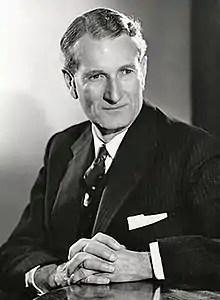John Peel (Leicester MP)
Sir William John Peel (16 June 1912 – 8 May 2004) was a British Conservative politician who served as Member of Parliament for Leicester South East from 1957 to 1974.
Sir John Peel | |
|---|---|
 | |
| Member of Parliament for Leicester South East | |
| In office 28 November 1957 – 8 February 1974 | |
| Preceded by | Charles Waterhouse |
| Resident Commissioner of the Gilbert and Ellice Islands | |
| In office 1949–1952 | |
| Preceded by | Henry Evans Maude |
| Succeeded by | Michael Bernacchi |
| 15th British Resident in Brunei | |
| In office 1946–1948 | |
| Monarch | George VI |
| Preceded by | Ernest Edgar Pengilly |
| Succeeded by | Eric Pretty |
| Personal details | |
| Born | William John Peel 16 June 1912 |
| Died | 8 May 2004 (aged 91) |
| Nationality | British |
| Political party | Conservative |
| Parent | William Peel (father) |
| Education | Wellington College, Berkshire |
| Alma mater | Queens' College, Cambridge |
| Awards | Knight Bachelor (1973) |
Early life
He attended Wellington College and Queens' College, Cambridge. His first career was in the Colonial Service; he survived imprisonment by the Japanese during the Second World War, when he was stationed in Singapore, to later serve terms as British Resident in Brunei and then Resident Commissioner in the Gilbert and Ellice Islands colony (now Kiribati and Tuvalu) before retiring in 1952. His father Sir William Peel had been Governor of Hong Kong.
Political career
Peel was elected as a member of the House of Commons at a by-election in 1957. In July 1959, he provoked angry responses from the House when he reacted to the Mau Mau rebellion in Kenya by stating: "There are obvious risks in dealing with desperate and sub-human individuals." In the resulting debate, Peel's remarks were denounced by Enoch Powell, who commented: "We cannot, we dare not, in Africa of all places, fall below our highest standards in the acceptance of responsibility".[1][2][3] Though Peel's tenure of minor government positions was uninterrupted, he never reached the Cabinet.
He was a zealous advocate of British involvement in Europe, through the Council of Europe, the Western European Union, and eventually membership—of which he was a leading advocate—in the European Communities. In 1972, he was chosen President of the North Atlantic Assembly. In the following year he was knighted, and also became one of the first British members of the European Parliament.
References
- "Sir John Peel". The Telegraph. 12 May 2004. Retrieved 22 June 2021.
- Roth, Andrew (14 May 2004). "Sir John Peel". The Guardian. Retrieved 22 June 2021.
- John Peel, Member of Parliament (27 July 1959). "Hola Camp, Kenya (Report)". Parliamentary Debates (Hansard). Vol. 910. Parliament of the United Kingdom: House of Commons. col. 181-262.